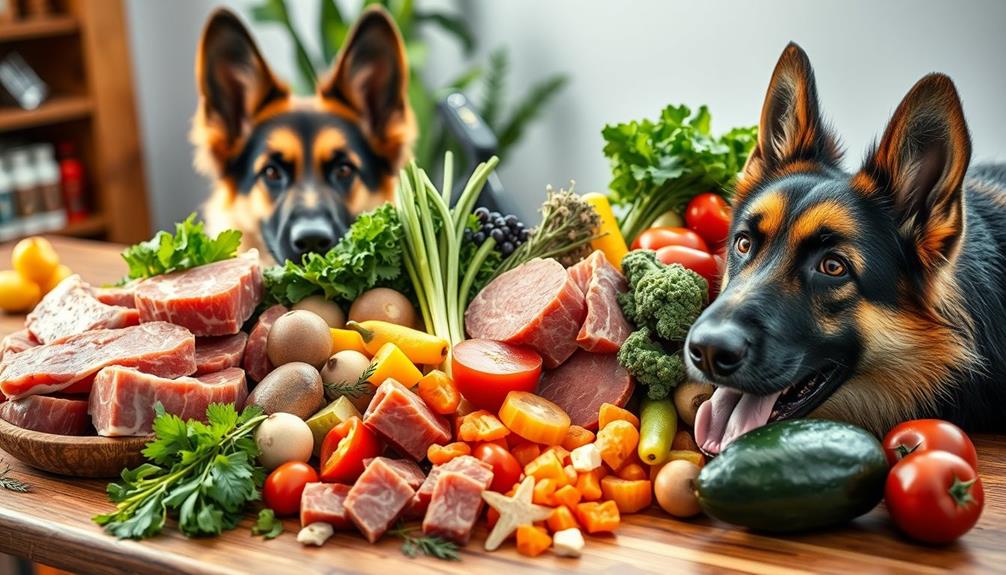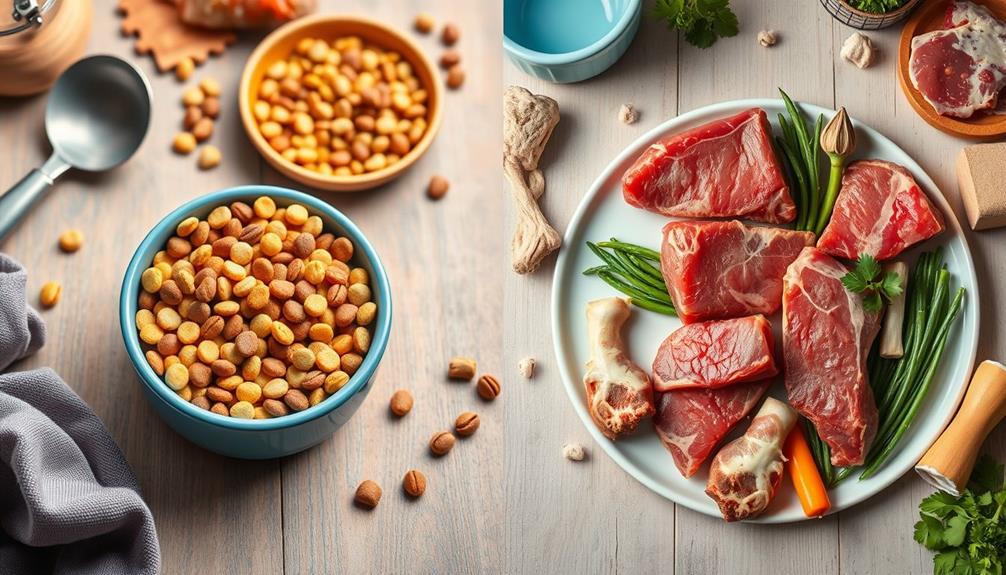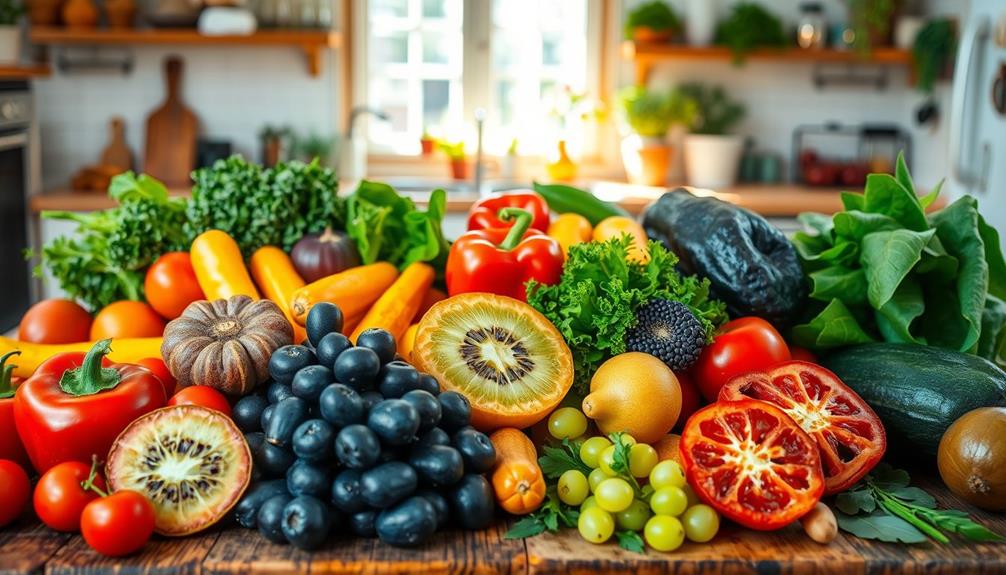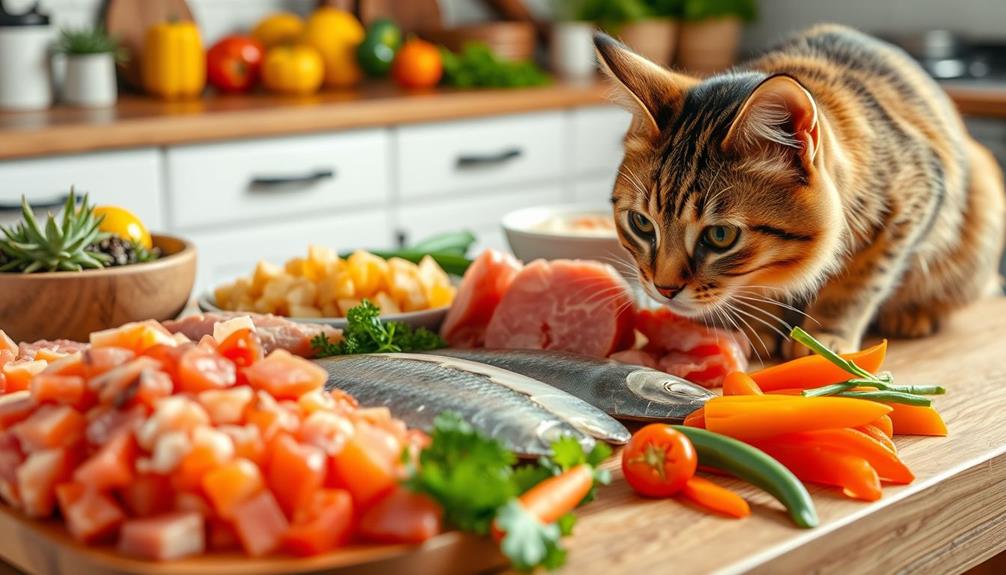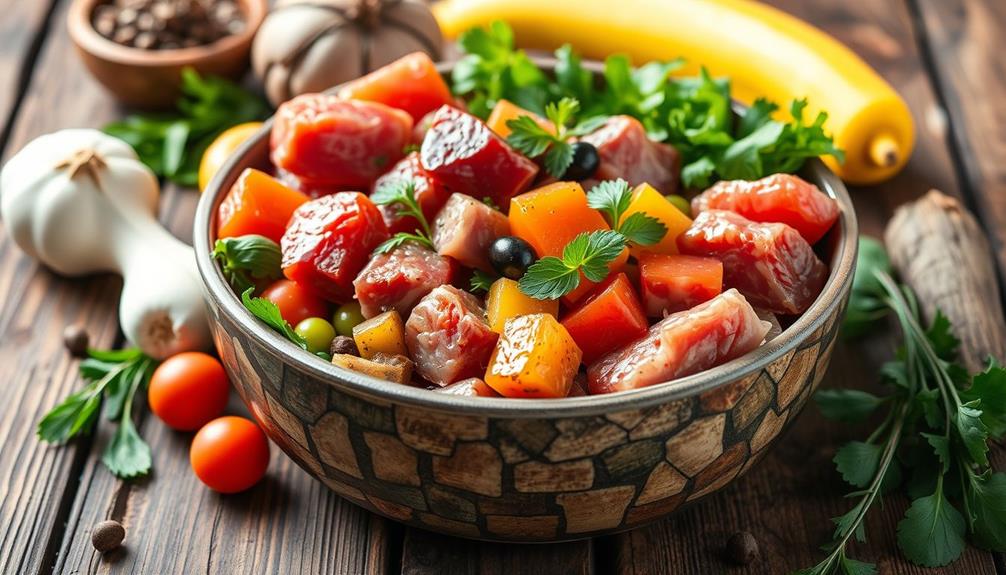The best raw food for your German Shepherd can include lean cuts of beef, poultry like chicken and turkey, and fish such as deboned salmon. Game meats like venison or rabbit are good options too, especially for dogs with food allergies. It's crucial to introduce these proteins gradually and focus on maintaining a balanced diet, perhaps with organ meats for added nutrients. Don't forget about nutritional supplements, such as omega-3 oils and probiotics, to support overall health. There's so much more to explore regarding feeding your German Shepherd the best raw diet options available. Many dog owners also incorporate raw eggs into their German Shepherd’s diet for an added boost of protein and essential nutrients. Additionally, incorporating a variety of vegetables and fruits can provide necessary vitamins and minerals, making it important to research safe and beneficial options for raw food for dogs. With proper research and guidance from a veterinarian or canine nutritionist, you can create a balanced and nutritious raw food diet for your German Shepherd that supports their overall health and well-being. It’s important to note that not all raw foods are safe for your German Shepherd, so be sure to avoid giving them things like raw bones, onions, garlic, and certain fruits with toxic pits or seeds. Consult with a professional to ensure you are providing a safe and appropriate raw food diet for dogs. By doing so, you can ensure that your German Shepherd stays healthy and happy with the best possible nutrition.
Key Takeaways
- Lean meats like beef, poultry, and game provide essential protein and nutrients for German Shepherds on a raw diet.
- Incorporating organ meats, such as liver, enhances nutritional diversity and supports overall health.
- Fish options like deboned salmon and mackerel offer omega-3 fatty acids for improved skin and coat health.
- A gradual transition to raw food, starting with 25% raw and monitoring health, ensures a smooth adjustment.
- Nutritional supplements like probiotics and omega-3 oils are vital for balanced nutrition in a raw diet.
Safety of Raw Food
When considering the safety of raw food for your German Shepherd, you'll find that their unique digestive system plays a significant role. German Shepherds have a highly acidic stomach pH, which helps minimize bacterial risks associated with raw meat consumption. Their shorter intestinal tracts enable them to efficiently extract nutrients from a raw food diet, making it a suitable option for their carnivorous nature.
Proper diet is imperative for overall health, as indicated in the Ultimate Hamster Care Guide, emphasizing the importance of quality ingredients.
While concerns about bacteria, such as Salmonella, exist, dogs are generally less affected. Their rapid digestion reduces the likelihood of bacterial illnesses compared to humans. However, it's important to be cautious about certain human foods that are toxic to dogs, like onions, grapes, and chocolate, even when you're feeding raw.
Additionally, regulatory concerns have emerged regarding contamination levels in pet food. Notably, historical data indicates that kibble may have higher contamination levels than raw diets, suggesting that when sourced correctly, a raw food diet could be a safer option.
Ensuring a balanced diet is essential for your German Shepherd's overall health, so focus on quality ingredients and proper handling to enhance the safety of raw food for your furry friend.
Transitioning to Raw Diet
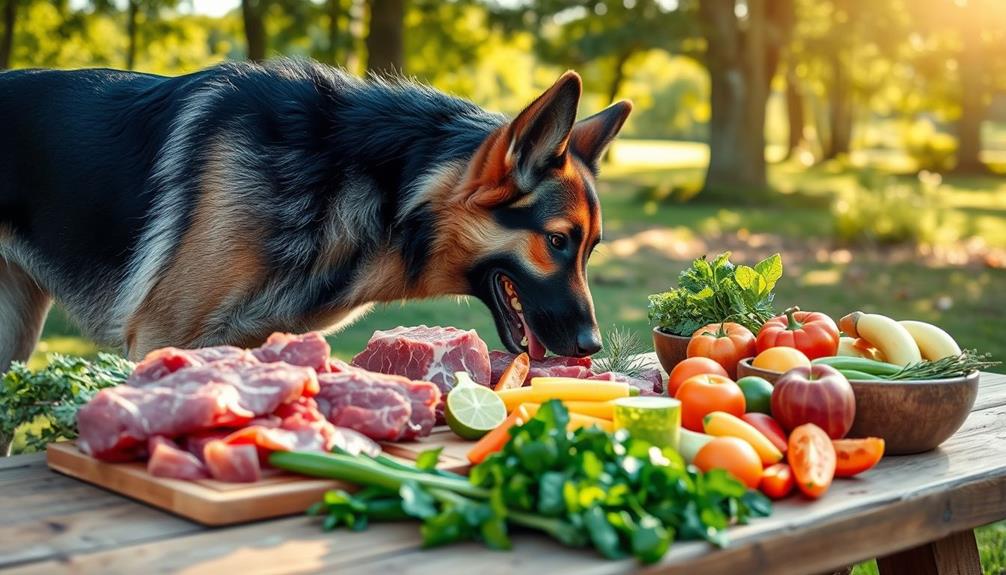
Shifting your German Shepherd to a raw diet requires careful planning to guarantee a smooth adjustment. Start by mixing 25% raw food with 75% kibble, gradually increasing the raw percentage over 1-2 weeks. This gradual shift helps minimize digestive upset in your dog's digestive system.
During this time, you'll want to closely monitor your German Shepherd's digestion, energy levels, and overall health. It's also important to make sure that the raw food is nutrient-rich and balanced to support your dog's well-being, as nutrient deficiencies can be a concern with improper diets nutrient deficiencies.
Introduce new protein sources like chicken or beef one at a time, allowing 1-2 weeks between each to see how your dog responds. This method guarantees you can easily identify any food sensitivities.
Make sure your raw food intake is between 2-4% of your dog's body weight; for example, an 80-pound German Shepherd should consume about 1.5 to 3.2 pounds of raw food daily.
Before starting the raw diet, consider fasting your dog for 12-24 hours. This helps reset their digestive system and prepares them for the new food.
As you shift your dog, be ready to make adjustments to their diet based on their reactions and needs. With patience and attention, your German Shepherd will thrive on a raw diet.
Recommended Raw Meats
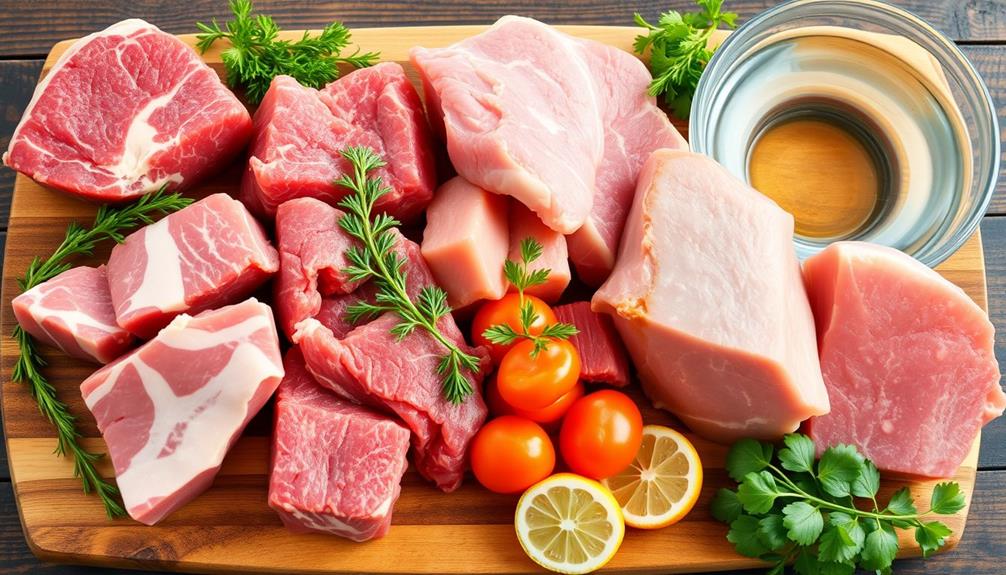
For a successful raw diet, selecting the right meats is essential for your German Shepherd's health. You'll want to focus on a variety of recommended raw meats that provide balanced nutrition and cater to your dog's needs. When choosing raw food for dogs, it’s important to include a mix of muscle meat, organ meat, and raw meaty bones to ensure your German Shepherd is getting a well-rounded diet. This will provide the necessary protein, vitamins, and minerals to support their overall health and well-being. Additionally, consulting with a veterinarian or canine nutritionist can help ensure you are providing the best raw food for dogs to meet your German Shepherd’s specific dietary requirements.
| Type of Meat | Benefits |
|---|---|
| Lean Cuts of Beef | Ground beef and heart offer essential protein and nutrients. |
| Poultry Options | Chicken, turkey, and duck are great, but remember to remove small bones to prevent choking. |
| Fish & Game Meats | Salmon, mackerel (deboned) provide omega-3s for healthy skin, while venison, bison, and rabbit can reduce food allergies. |
Including organ meats, like liver, in moderation can also enhance your dog's diet. Lean cuts of lamb can be beneficial as well, ensuring your German Shepherd gets a variety of flavors and nutrients. By mixing these options, you create a diverse menu that keeps your pup excited about mealtime while maintaining their health. Remember, variety is key to preventing food allergies and ensuring your dog thrives on their raw food diet.
Nutritional Supplements
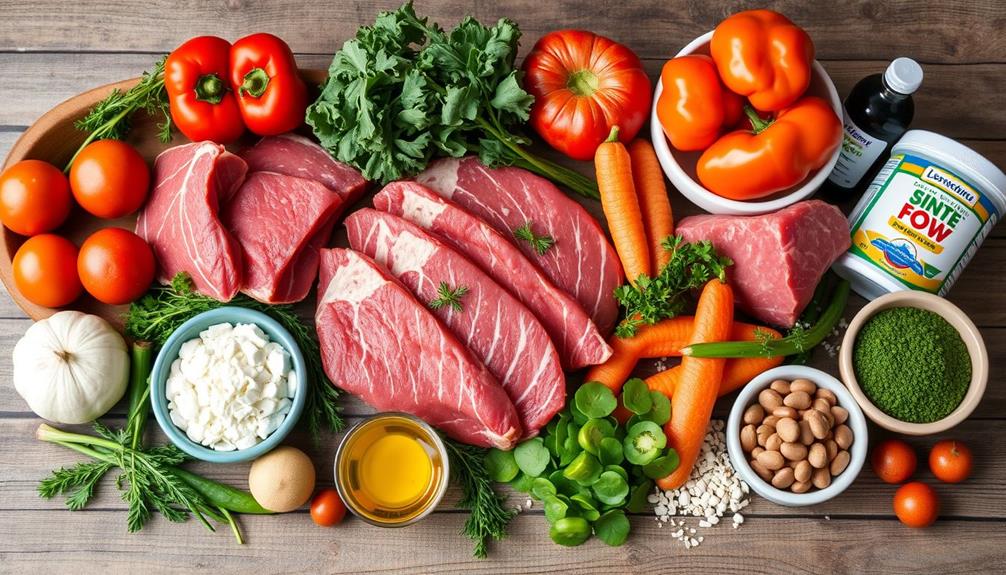
When you feed your German Shepherd a raw diet, adding nutritional supplements is vital for balanced nutrition.
Essential nutrients from products like mushroom supplements can boost immunity and gut health, helping your dog thrive.
Additionally, consider incorporating elements from cold medications overview to guarantee your pet remains healthy and supported.
Always consult your vet for the right dosages to make certain your furry friend gets the most out of these supplements.
Essential Nutrient Sources
Nutritional supplements play an important role in guaranteeing your German Shepherd thrives on a raw food diet. By incorporating the right supplements, you can enhance your dog's health and vitality considerably.
For instance, fermented cod liver oil is a fantastic source of omega-3 fatty acids, which promote healthy skin and coat. Flaxseed oil adds crucial fatty acids to your dog's diet, contributing to their overall wellness. Additionally, consider incorporating essential oils for overall wellness to support your dog's health.
Adding probiotics, like homemade yogurt, helps maintain gut health and improve digestion, both critical for dogs on a raw diet. Vitamins and minerals are also crucial; consider supplements like King Kanine that provide essential nutrients and antioxidants to support your German Shepherd's immune system.
Turmeric is another excellent choice, offering anti-inflammatory benefits that may help prevent chronic conditions and support long-term health.
Mushroom Supplement Benefits
Incorporating mushroom supplements into your German Shepherd's raw food diet can greatly boost their overall health. Mushrooms like Reishi, Shiitake, and Turkey Tail are rich in antioxidants that combat oxidative stress and support immune function. By adding these mushroom supplements, you enhance your dog's immune response, benefiting their overall health and promoting disease prevention.
Additionally, a well-balanced diet is essential for maintaining your dog's overall wellness and longevity, making it vital to understand financial terms that can help you budget for quality pet nutrition.
Moreover, certain mushrooms, such as Lion's Mane, are known to improve cognitive function, which can be especially helpful for older dogs facing age-related memory issues. This means that your German Shepherd can maintain sharp mental faculties as they age.
Mushroom supplements also work wonders for gut health, thanks to their prebiotic properties. These properties foster a healthy microbiome, effectively addressing digestive problems and guaranteeing your dog thrives. By supporting their gut health, you can help your German Shepherd enjoy a happier, more comfortable life.
When choosing mushroom supplements, always source them from reputable suppliers to guarantee safety. Avoid wild mushrooms, which can pose toxicity risks. With the right mushroom supplements, you can provide your German Shepherd with a powerful nutritional boost.
Health Benefits Overview
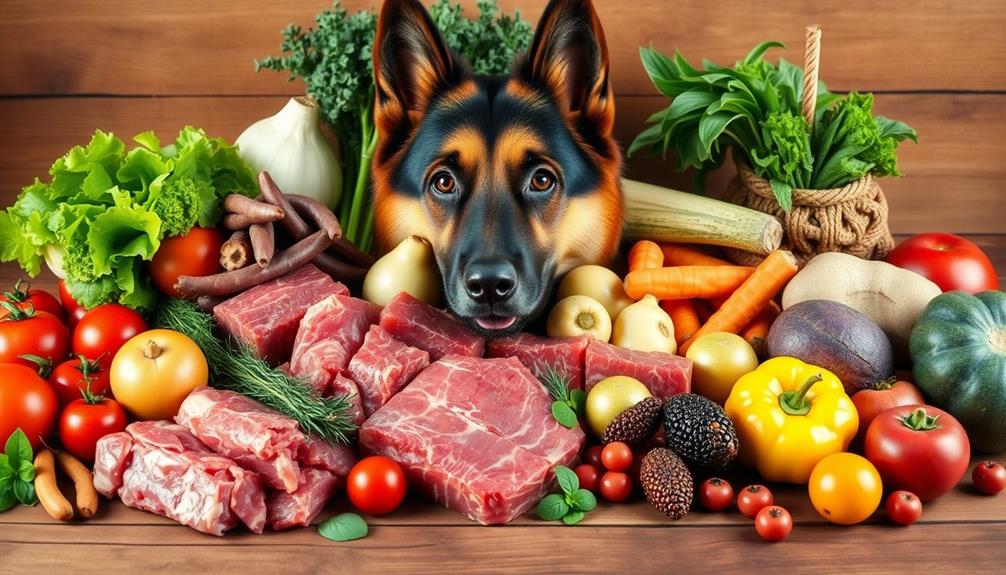
Switching your German Shepherd to a raw food diet can lead to significant health improvements, including better nutrient absorption.
Incorporating healthy dog snacks made from natural ingredients can further enhance their overall wellness.
You'll likely notice an enhanced coat and skin condition, along with improved digestive health as their bodies process natural ingredients more efficiently.
These benefits not only boost their energy but also contribute to their overall well-being.
Nutrient Absorption Benefits
A raw food diet can greatly enhance nutrient absorption for your German Shepherd. By providing high-quality protein, essential vitamins, and minerals, raw food allows for better bioavailability compared to processed kibble. This means your dog can utilize nutrients more efficiently, leading to improved overall health.
Additionally, incorporating a variety of proteins and vegetables can further support your dog's growth and development, as different foods offer unique benefits that contribute to a balanced diet. Understanding the importance of key domains of development in psychology can also help you appreciate how nutrition influences your pet's emotional and physical well-being.
Here are three key benefits of a raw food diet for nutrient absorption:
- Natural Enzymes: Raw meat contains natural enzymes that aid digestion, helping your German Shepherd break down food more effectively and absorb nutrients better.
- Hydration: The high moisture content in raw foods helps maintain hydration, which supports ideal digestion and nutrient uptake, ensuring your dog gets the most out of their meals.
- Reduced Food Sensitivities: Raw diets can minimize the risk of food sensitivities and allergies, allowing for more efficient absorption of essential nutrients, keeping your dog healthy and active.
Enhanced Skin and Coat
With a raw food diet, you'll likely notice a remarkable improvement in your German Shepherd's skin and coat health. A raw diet rich in high protein from raw meats promotes skin regeneration and strengthens coat health, giving your dog a fuller, shinier look.
Crucial fatty acids, especially omega-3s found in fish and flaxseed oil, enhance coat shine and reduce inflammation, contributing to a healthier appearance. This approach mirrors the increasing interest in wellness, much like the trend seen in spiritual retreats that promote holistic health.
Incorporating raw organ meats, like liver, provides essential B vitamins and minerals that support skin health, helping to prevent conditions such as dryness and flakiness.
Additionally, the act of chewing on raw meaty bones aids in maintaining dental health, which indirectly benefits your dog's skin and coat by minimizing the risk of infections that could affect their skin.
Many dogs on a raw diet experience a reduction in allergies and sensitivities, leading to fewer skin irritations and a more resilient coat.
Improved Digestive Health
Improved digestive health is one of the standout benefits of feeding your German Shepherd a raw food diet. Their digestive systems are naturally adapted to handle raw meat, which can lead to fewer gastrointestinal issues.
By shifting to raw food, you can support your dog's overall gut health and nutrient absorption. Additionally, maintaining a balanced diet rich in essential nutrients is vital for your dog's overall well-being, similar to how a balanced diet benefits human health.
Here are three key advantages of a raw diet for your German Shepherd's digestive health:
- Inclusion of Raw Bones: These promote healthy chewing and firm stool consistency, which can further enhance digestion.
- Natural Enzymes: Raw diets often contain enzymes that support digestion, aiding in better nutrient absorption and maintaining a balanced gut flora.
- High Protein, Low Carbs: The high protein content helps minimize food sensitivities and allergies, contributing to a healthier digestive system.
Shifting to raw food gradually is essential, as it allows your German Shepherd's gut flora to adjust, reducing instances of diarrhea and other digestive disturbances.
Common Health Risks
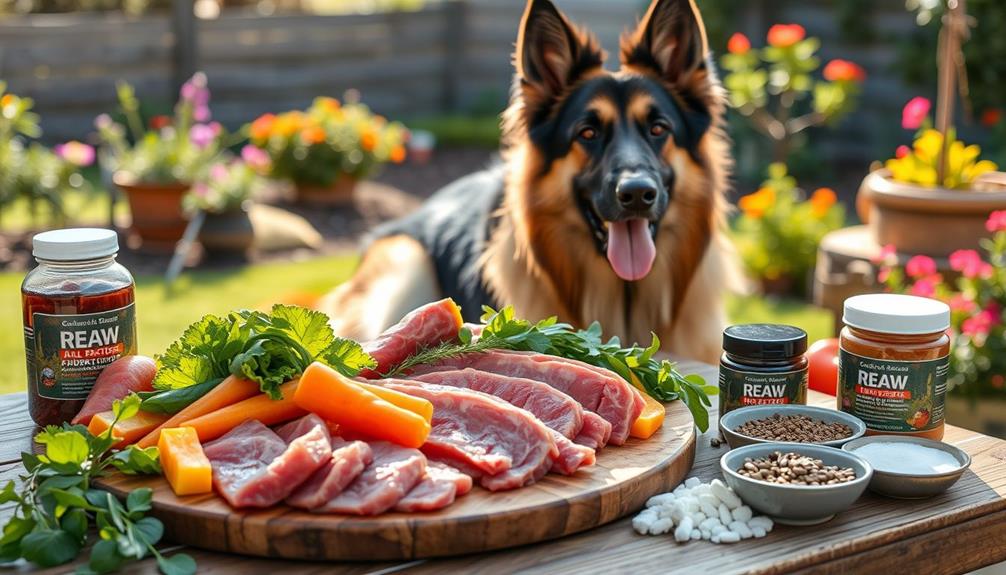
Feeding your German Shepherd a raw food diet comes with several common health risks that you should be aware of. One major concern is bacterial contamination, like Salmonella, which can affect humans handling the food, even if it doesn't greatly harm your dog.
Additionally, certain human foods, such as onions and garlic, can lead to serious health problems if ingested alongside raw food. It's also essential to understand the importance of regular health screenings for your dog, similar to how mammography aims to detect breast cancer early.
Improperly balanced raw diets can cause nutritional deficiencies or excesses, leading to issues like bone deformities or organ dysfunction. When shifting to a raw food diet, doing so too quickly can result in gastrointestinal upset, including diarrhea or vomiting. It's vital to introduce the new diet gradually over 1-2 weeks.
While raw bones are generally safer than cooked ones, they still pose choking hazards or may cause dental fractures if you don't choose them carefully. Proper selection of bones is important.
As you consider feeding your dog a raw food diet, staying informed about these risks will help you make safer choices for your German Shepherd's health.
Frequently Asked Questions
What Is the Number One Food for German Shepherds?
When considering the number one food for German Shepherds, focus on high-quality protein sources like beef or chicken. They provide essential nutrients, keeping your dog healthy and active, while supporting their dietary needs effectively.
How Much Raw Meat Should a German Shepherd Eat per Day?
You wouldn't believe how much raw meat your German Shepherd can devour! Generally, aim for 2-4% of their body weight daily. For an 80-pound pup, that's about 1.5 to 3.2 pounds of meaty goodness!
What Is the Most Nutritious Raw Meat for Dogs?
When considering the most nutritious raw meat for dogs, you'll want lean cuts of beef, poultry, and lamb. Don't forget organ meats and fish for added vitamins and omega-3s to support your dog's health.
Which Raw Meat Is Better for Dogs?
When choosing raw meat for dogs, consider options like beef, poultry, or fish. Each offers unique benefits, so you'll want to choose based on your dog's preferences and any specific dietary needs they might have.
Conclusion
In choosing the best raw food for your German Shepherd, you're not just feeding a pet; you're nurturing a loyal companion, boosting their energy, and enhancing their happiness. By prioritizing safety, making a seamless change, and selecting high-quality meats, you're investing in their health and well-being. Embrace the rewards of a raw diet, and relish the joy it brings to both you and your furry friend. Together, you'll thrive on this journey of health and connection. Don’t forget to consider the unique dietary needs of your German Shepherd when exploring raw food options for your cat. Every pet is different, so it’s important to do your research and consult with a veterinarian to ensure you’re providing the best nutrition for each of your furry friends. With careful consideration and proper planning, you can create a harmonious and healthy environment for all of your beloved pets.

